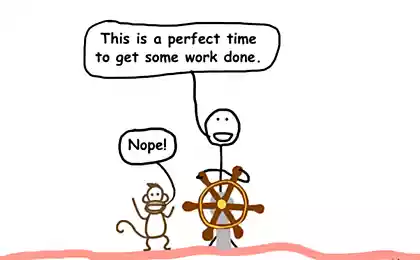521
What really can make our life happy
Imagine this situation: you get rich by winning the lottery. Now imagine that suddenly you became paralyzed legs. Which of these things will make you a happy person?

The answer is obvious, isn't it? Of course, you say, unequivocally winning the lottery!
However, when psychologists began to study this question empirically, we received the results do not quite confirm our intuitive assumptions. Naturally, hitting the jackpot the lucky ones in the next 12 months were significantly happier than people with paralysis of the lower limbs. Wealth and related pleasures became for them a pleasant gift, you can not say about the deprivation of opportunities to move around.
But after a year the differences between these people disappeared. Both groups were awarded the same level of happiness they experienced before their life changed. In other words, when both groups had adapted to a new status, their expectations are equal: the disabled began to find joy in the little victories, and winners of the lottery used to her luxurious lifestyle.
This example illustrates the basic error of the human mind: we cannot determine reliably what will make our life happy and ill predict exactly what might bring us joy. Philosopher garret Merriam from the University of southern Indiana calls this human inability to determine the criteria of happiness "displacement effects" (according to a psychology Professor from Harvard's Daniel Gilbert).
"We are confident that pretty well imagine how we will feel in the near future – a few days, a week or so. Therefore, we expect that happiness will be with us much longer than it lasts in reality".
As a rule, we believe that moving to another city, marriage, birth of children, etc. will make us happy for years to come. However, this is definitely not true. Psychologists call it "habituation effect".
Description of the graphic: "Four separate studies show that marital satisfaction decreases dramatically after the birth of the first child and increases only after the child begins to live separately from parents."
The graph shows that contrary to popular belief, actually children do not make us happy.
What happens: if the actual offspring does not make us happy, it is likely that the career will provide us a bright future? And then scientists hasten to disappoint us. In 2012, the study found "no evidence that promotion has a positive effect on General health and life satisfaction". Moreover, the researchers noted the deteriorating mental state of the employee after promotion, due to the increased level of anxiety.
"Fame, talent, wealth, beauty; most people think that having these benefits, they will certainly be happy, says Merriam – but it turns out that people possessing all of the above, are not much happier than those who did not get these benefits".
Professor Daniel Gilbert also believes that winning the lottery is not a panacea and loss of leg is not the end. We are able to synthesize happiness. Many people are looking for sources of happiness outside, expecting to find it in things or relations, or large Bank accounts. But real happiness comes from within. True happiness comes when we learn to be content with what we have.
source:mixstuff
Source: /users/1077

The answer is obvious, isn't it? Of course, you say, unequivocally winning the lottery!
However, when psychologists began to study this question empirically, we received the results do not quite confirm our intuitive assumptions. Naturally, hitting the jackpot the lucky ones in the next 12 months were significantly happier than people with paralysis of the lower limbs. Wealth and related pleasures became for them a pleasant gift, you can not say about the deprivation of opportunities to move around.
But after a year the differences between these people disappeared. Both groups were awarded the same level of happiness they experienced before their life changed. In other words, when both groups had adapted to a new status, their expectations are equal: the disabled began to find joy in the little victories, and winners of the lottery used to her luxurious lifestyle.
This example illustrates the basic error of the human mind: we cannot determine reliably what will make our life happy and ill predict exactly what might bring us joy. Philosopher garret Merriam from the University of southern Indiana calls this human inability to determine the criteria of happiness "displacement effects" (according to a psychology Professor from Harvard's Daniel Gilbert).
"We are confident that pretty well imagine how we will feel in the near future – a few days, a week or so. Therefore, we expect that happiness will be with us much longer than it lasts in reality".
As a rule, we believe that moving to another city, marriage, birth of children, etc. will make us happy for years to come. However, this is definitely not true. Psychologists call it "habituation effect".
Description of the graphic: "Four separate studies show that marital satisfaction decreases dramatically after the birth of the first child and increases only after the child begins to live separately from parents."
The graph shows that contrary to popular belief, actually children do not make us happy.
What happens: if the actual offspring does not make us happy, it is likely that the career will provide us a bright future? And then scientists hasten to disappoint us. In 2012, the study found "no evidence that promotion has a positive effect on General health and life satisfaction". Moreover, the researchers noted the deteriorating mental state of the employee after promotion, due to the increased level of anxiety.
"Fame, talent, wealth, beauty; most people think that having these benefits, they will certainly be happy, says Merriam – but it turns out that people possessing all of the above, are not much happier than those who did not get these benefits".
Professor Daniel Gilbert also believes that winning the lottery is not a panacea and loss of leg is not the end. We are able to synthesize happiness. Many people are looking for sources of happiness outside, expecting to find it in things or relations, or large Bank accounts. But real happiness comes from within. True happiness comes when we learn to be content with what we have.
source:mixstuff
Source: /users/1077
8 books, who for various reasons were banned, but you can read them
Children repeat the behavior and consumer habits of their parents
























